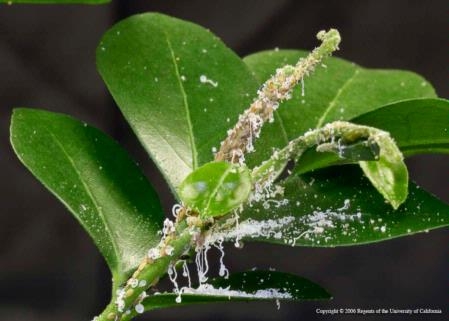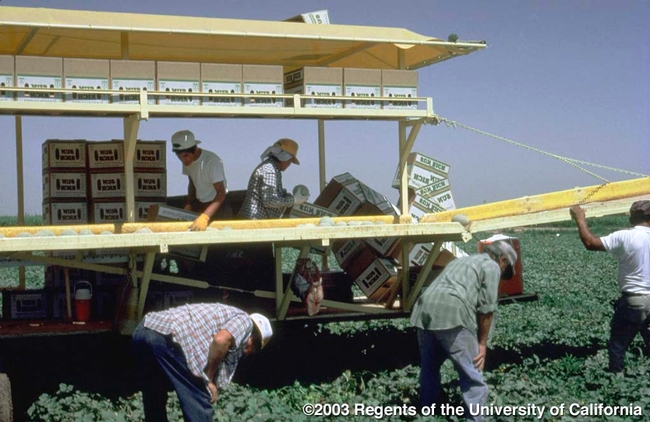Posts Tagged: Manuel Jimenez
Western Farm Press runs 1,000-word story on Kearney blueberry event
The annual Blueberry Open House at the UC Kearney Agricultural Research and Extension Center last month warranted lengthy coverage by Western Farm Press.
Freelance writer Dennis Pollock reported that Manuel Jimenez, UC Cooperative Extension advisor in Tulare County, a small-scale farming expert, walked among the mature blueberry plants at Kearney, describing their good points and bad points.
"The perfect blueberry would be one that is big, firm, sweet, easy to harvest and grows in high pH (soil conditions)," he said.
At the event, Richard Molinar, UCCE advisor in Fresno County, small-scale farming, conducted a blueberry tasting, allowing those who attended to vote for their favorite three varieties. He said that variety isn't the only factor impacting flavor.
"Flavor is also affected by weather, soil factors, plant nutrition and irrigation frequency," Molinar said.
Jimenez introduced growers to two new research projects in blueberries:
- Jimenez and Larry Schwankl, Kearney-based UCCE irrigation specialist in the UC Davis Department of Land, Air and Water Resources, have teamed to study the effects of varying irrigation levels on blueberries.
- Jimenez has grafted popular blueberry varieties onto the roots of farkleberry (Viccinium abroreum), which has greater tolerance of alkaline soils like those found in the San Joaquin Valley. By reducing or eliminating soil and water acidification, using the alternate rootstock may provide a significant cut in production costs.

Manuel Jimenez leads a tour of the 15-year-old blueberry research plot.
Not all blueberries are alike
As blueberries have become more a popular plant for home gardening, variety choices have blossomed, wrote Laura Christman in the Redding Record Searchlight.
When it comes to flavor it's hard to go wrong with any variety of homegrown blueberry, said Manuel Jimenez, a University of California Cooperative Extension farm advisor specializing in blueberries.
"All the varieties that ripen on the plant are good," said Jimenez, who is based in Tulare County.
Among the varieties Jimenez recommends are Misty, Reveille, Sharpblue, Star, Legacy, Emerald and Jewel.
The best time to plant blueberries is in the fall, when the ground is warm and plants can establish roots, Jimenez said. However, most nurseries don't feature them in fall. The biggest selection of blueberry plants is available now.

Manual Jimenez talks blueberries at the UC Kearney Agricultural Research and Extension Center last fall.
Abundant holiday confections demand self-discipline
UC Cooperative Extension nutrition, family and consumer sciences advisor Concepcion Mendoza told Mosby the health problems related to consistent, excessive sugar consumption include obesity, diabetes, hyperglycemia and hypoglycemia, increased risk of heart disease, depression, hypertension, cancer, tooth decay, gum disease and an overall undermining of the body's endocrine system.
"As our body tries to metabolize sugar, sugar draws on our body's reserve of vitamins and minerals," she said. "When those reserves are gone, the metabolism of good cholesterol and fatty acids is impeded, contributing to higher blood serum, triglycerides and bad cholesterol."
The article suggests eating a holiday treat when at celebrations, "but savor a small piece of something sweet rather than sampling everything available."
Woodlake Pride: Youth in gardens, out of gangs
Gosnia Wozniacka (Associated Press), San Francisco Chronicle
Over the past seven years, UC Cooperative Extension farm advisor Manuel Jimenez and his wife Olga have taught hundreds of young volunteers farming techniques, work habits and communication skills to prepare them for jobs or college. With creativity and help from the community, they turned 14 desolate acres into lush gardens of vines, vegetables and fruit trees. And the local police chief credits the program, Woodlake Pride, with helping fight local gang crime.
"We want to grow kids in our gardens, because we've seen what violence, drugs and alcohol can do," Jimenez said.
Natural enemy of Asian citrus psyllid coming soon to SoCal
At a Nov. 16 research symposium in Oxnard, hosted by the University of California Cooperative Extension and Hansen Agricultural Center, UC Riverside entomologist Mark Hoddle said that he had completed the testing required to secure federal approval for release of a tiny wasp that preys on ACP, reported John Krist in the Ventura County Star.
The federal government has promised to expedite approval, the article said. Some of the natural enemies - collected in the Punjab, Pakistan - could be carrying the fight against ACP into Los Angeles yards by the end of the year.
Hoddle also said a citrus variety he observed being grown in the Punjab appears able to survive and produce fruit despite the presence of ACP and HLB.
Drought and rising temperatures will challenge California's farmers, experts say
By Suzanne Bohan, Contra Costa Times
In the past century, the state's winter lows have warmed by 2 degrees Fahrenheit, "a significant increase," Dan Sumner, director of the Agricultural Issues Center, told a forum last week. Although that warming trend hasn't yet disrupted crops, it is accelerating, he said. "There's potential for complete crop failure, especially cherries, apricots and other stone fruit," said Louise Jackson, a UC Davis researcher. As an example, Sumner said that as winters heat up, peach growers in the warmer southern San Joaquin Valley may have to move northward, where it's cooler. With California's diversity of crops and different microclimates, the agricultural system has a natural resiliency, although Sumner said now is the time to begin researching ways to best cope with anticipated changes. "I think the risk is we don't take it seriously enough," Sumner said. "The lesson here is you have to have enough research and development to adapt and be flexible. And I don't think we're doing enough."
Health hazards similar in San Joaquin, Coachella valleys
Marcel Honoré, The Desert Sun
A new study on the the environmental health risks across Central California describes conditions strikingly similar to those confronting many eastern Coachella Valley residents. More than 1 million people living in the sprawling San Joaquin Valley face serious health risks from toxic air, polluted water and other environmental factors, according to a University of California, Davis, report published earlier this month.
Food chain holds promise
Doug Ford, The (Vacaville) Reporter
The Solano and Yolo County Joint Economic Summit on agriculture, held at the University of California, Davis, Alumni Center, noted that the area boasts some of the best land and water resources in the world and is ideally located between the populous San Francisco Bay Area and the state capital, with an excellent transportation infrastructure connecting us with world markets. The local "food chain industry," the article said, contributes about 10 percent of the gross domestic product of the area, and its products added up to about $2.5 billion in 2009.
Bravo Lake garden keeps local youths out of trouble
David Castellon, Visalia Times-Delta
Manuel Jimenez and his wife, Olga, spent Black Friday at the Bravo Lake Botanical Garden — the 13-acre public garden and walking trail they helped create about eight years ago — along with a group of teenage boys who volunteered to help.
“The garden is not our goal,” said Jimenez, 61, a University of California Cooperative Extension farm advisor. “Our goal is to grow kids. Our goal is to make something of them.”
Food safety specialist addresses cantaloupe guidelines
Trevor Suslow, UC Cooperative Extension food safety specialist at Davis, was told by the farm owner that they believed the postharvest system used in conjunction with the outbreak was an improvement over their previous methods — though Suslow disagrees. He acknowledges, however, that the FDA does not make a definitive statement in its growing guidelines on the safest method of cleaning, cooling or packing cantaloupe.
Agricultural program helps keep youth out of gangs
An Associated Press article by Gosia Wozniacka profiles volunteer work by Manuel Jimenez, UC Cooperative Extension farm advisor in Tulare County. The article was published by news outlets such as the Fresno Bee, San Francisco Chronicle, ABC News, Fox News, CBS News, Seattle Post-Intelligencer and others.
He and wife Olga teach life skills and farming techniques to youth on a 14-acre garden in Woodlake, Calif.
"We want to grow kids in our gardens, because we've seen what violence, drugs and alcohol can do," Jimenez told the reporter.
The article also includes comments from youth volunteers in the program, past and present.
"Everything Manuel did was interesting to me," said Walter Martinez, who is now a UC Cooperative Extension field assistant and also served as a volunteer at the garden through middle and high school.




